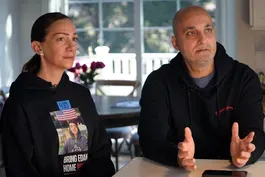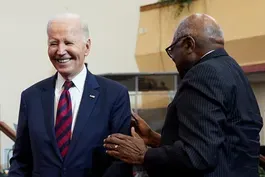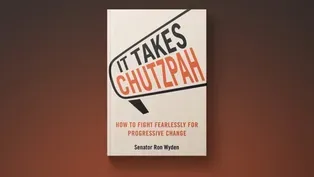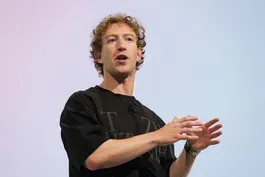
The history and tradition of presidential transition letters
Clip: 1/19/2025 | 4m 20sVideo has Closed Captions
The history and tradition of presidents leaving personal notes for their successors
Monday’s change of Oval Office occupants is a ritual full of traditions and customs. One of the more modern ones began in 1989, when Ronald Reagan left a note for George H.W. Bush on stationery with a whimsical bit of advice. John Yang speaks with Lindsay Chervinsky, executive director of the George Washington Presidential Library, to learn more about this tradition.
Major corporate funding for the PBS News Hour is provided by BDO, BNSF, Consumer Cellular, American Cruise Lines, and Raymond James. Funding for the PBS NewsHour Weekend is provided by...

The history and tradition of presidential transition letters
Clip: 1/19/2025 | 4m 20sVideo has Closed Captions
Monday’s change of Oval Office occupants is a ritual full of traditions and customs. One of the more modern ones began in 1989, when Ronald Reagan left a note for George H.W. Bush on stationery with a whimsical bit of advice. John Yang speaks with Lindsay Chervinsky, executive director of the George Washington Presidential Library, to learn more about this tradition.
How to Watch PBS News Hour
PBS News Hour is available to stream on pbs.org and the free PBS App, available on iPhone, Apple TV, Android TV, Android smartphones, Amazon Fire TV, Amazon Fire Tablet, Roku, Samsung Smart TV, and Vizio.
Providing Support for PBS.org
Learn Moreabout PBS online sponsorshipJOHN YANG: Tomorrow's change of Oval Office occupants is a ritual full of traditions and customs.
One of the more modern ones began in 1989 when Ronald Reagan left a note for George H.W.
Bush on stationary with a whimsical bit of advice.
Since then, the messages have often been heartfelt and written on more staid White House stationery, like the one Bush himself left for Bill Clinton, wishing him great happiness.
Lindsay Chervinsky is the executive director of the George Washington Presidential Library.
Lindsey, since Reagan left that note in 1989, by my count, there have been five of those notes.
Has there been a common theme?
LINDSAY CHERVINSKY, GEORGE WASHINGTON PRESIDENTIAL LIBRARY: Well, I think theme in general is about patriotism, service, the importance of the office being bigger than one person and sort of an inspirational encouragement for the next person in office.
JOHN YANG: How are they usually left?
Are they handed to them or how does it work?
LINDSAY CHERVINSKY: They're usually left on the desk.
It's usually one of the last things a president does.
They'll usually write their successor's name and then leave it on the desk for them to find when they come into the office for the first time.
JOHN YANG: They come in the office for the first time after the inaugural ceremony, after they come down Pennsylvania Avenue?
LINDSAY CHERVINSKY: Absolutely.
JOHN YANG: One of the longer ones was Barack Obama's for Donald Trump.
It was Donald Trump said he found it so thoughtful that he even called Obama to thank him for it.
What did it say?
LINDSAY CHERVINSKY: Yeah, this letter is interesting because it's a little bit more preachy than some of the other letters.
It kind of reminds Trump of The challenges that some Americans face, that they are not all as fortunate as Obama and Trump.
It reminds him about the importance of democratic norms and institutions, and the office being a symbol of that, not just being about Trump's political fortunes.
And it reminds him to enjoy his family while he's in office, because the job is a hard one.
JOHN YANG: Sometimes these letters are not made public for a while.
Should they remain private?
Should the private messages and communications between the two men?
Or is it important for American public to see this as part of the peaceful transition of power?
LINDSAY CHERVINSKY: I think it's appropriate for a president to keep them private for a little while, maybe while they're in office.
But I do think it is important for the American people to ultimately see them, because it does remind the Americans that the peaceful transfer of power is the bedrock of what it means to have a republic.
And this process, while sometimes a humorous one, sometimes a small one, is an important step in recognizing it's not about the people in the office, it's about the office itself.
JOHN YANG: Before Reagan started this tradition, were there similar things, similar messages and communications between presidents and their successors in history?
LINDSAY CHERVINSKY: Well, sometimes they would exchange letters, often after the inauguration.
I think the most important one perhaps occurred early in 1801, when John Adams had left Washington, D.C. went back to Massachusetts.
That election had been nearly catastrophic.
The threat of violence was real and palpable, and it was a real constitutional crisis.
And he got back home and he said to Jefferson, everything is peaceful here.
I wish you a safe and happy administration.
And that really set the tone for what we want presidents to do.
JOHN YANG: The notes that have been left since Ronald Reagan, are there any others that sort of stand out?
LINDSAY CHERVINSKY: Well, I think Reagan's is really fun because, you know, they had been in the administration together.
And as you said, the stationary is quite silly.
It's an elephant with little turkeys on it.
And it said, don't let the turkeys get you down.
And you might sometimes want to use this stationary.
And I think that humor is important because the job is so hard and the decisions are so difficult that if you don't have a sense of humor, I think it can crush you.
JOHN YANG: You know, you talk about the peaceful transfer of power in 2020.
There was almost a breakdown of that, a bitter argument over whether the election was stolen.
But still, Mr. Trump left a letter for Mr. Biden.
LINDSAY CHERVINSKY: He did, and we don't yet know what it said.
You know, Biden said that it was private and he was going to thank Trump personally for it.
I'm sure at some point we'll see it once the president's letters are made public.
But I find it encouraging that even when we had the most contested transition we've ever had, that letter still was there.
JOHN YANG: Lindsay Chervinsky, thank you very much.
LINDSAY CHERVINSKY: Thank you.
Father of U.S. hostage hopeful for son’s release by Hamas
Video has Closed Captions
Father of U.S.-Israeli hostage hopeful for son’s release as Gaza ceasefire gets underway (5m 29s)
News Wrap: Biden thanks supporters on last day of his term
Video has Closed Captions
News Wrap: Biden thanks supporters in South Carolina on last full day of his term (2m 18s)
Sen. Wyden offers way forward for progressives in new book
Video has Closed Captions
Sen. Wyden offers way forward for progressives in new book ‘It Takes Chutzpah’ (5m 30s)
Tech and AI leaders make big donations to Trump inauguration
Video has Closed Captions
Leaders in tech, AI and cryptocurrency make big donations to Trump inauguration (5m 42s)
Providing Support for PBS.org
Learn Moreabout PBS online sponsorshipMajor corporate funding for the PBS News Hour is provided by BDO, BNSF, Consumer Cellular, American Cruise Lines, and Raymond James. Funding for the PBS NewsHour Weekend is provided by...
















